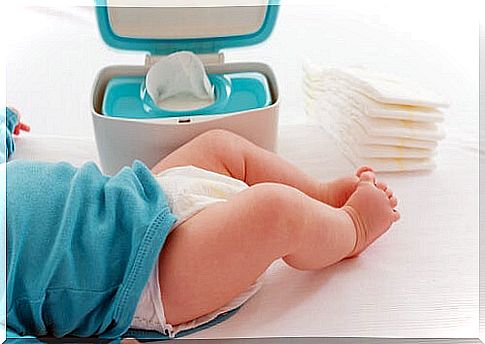Meconium In Newborns

Meconium is the baby’s first excretion shortly after birth. It can usually occur within 48 hours.
It is worth noting that meconium is composed of intestinal epithelial cells, water, lanugo, amniotic fluid and bile. In short they are sticky and dark green stools.
Meconium and its expulsion into the amniotic fluid
While in the mother’s womb, the baby inhaled amniotic fluid. All components dissolved in this substance accumulate in the fetus’ intestines and form meconium.
After being born, the meconium is expelled through the anus and does not cause any kind of problem. On the contrary, it is related to the expulsion of the first residues that are no longer needed by the body.
When delivery does not occur on time and the meconium reaches the fetal lungs, a medical complication called meconium aspiration syndrome occurs .

Meconium Aspiration Syndrome
Meconium aspiration syndrome (MAS) is an acute respiratory distress that occurs when a baby absorbs meconium dissolved in the amniotic fluid and it reaches their lungs. The amount and consistency of absorbed meconium will affect the baby to a greater or lesser extent.
Among the most common causes that allow this are:
- Pre eclampsia.
- Smoking.
- Placental insufficiency.
- Delay in fetal growth.
- Umbilical cord prolapse.
- Mother’s respiratory diseases.
- Cardiovascular disorders of women.
- Chorioamnionitis (infection of the amniotic fluid).
- Amniotic fluid shortage.
- Premature detachment of the placenta.
- The prolonged stay of the fetus in the mother’s womb (birth after the birth date).
Preventing meconium aspiration syndrome can be difficult. In fact, the only way to achieve this is to avoid unhealthy habits (such as smoking and alcoholism) and to maintain strict medical control.
To reduce the effects of this urgency, treatment must start from the moment of delivery, as this is the only way to avoid complications that lead to pulmonary hypertension or brain damage in the child.
keep in mind the time
The premature exit of the meconium is also related to a complication. This situation happens when the fetus is still inside the placenta and the meconium is expelled. On the other hand, delays in excretion after birth must be closely monitored.
It has been proven that the delay in this excretion is related to diseases such as cystic fibrosis or the meconium ileum (perforation of the intestines). Therefore, if the baby does not defecate, after 48 normal hours have elapsed, it is necessary to consult the pediatrician as soon as possible.

How to clean meconium
Cleaning the meconium requires a little more care than the rest of the stool. Since they have a sticky consistency, they adhere tightly to the skin and this makes cleaning difficult. However, there is no need to lose your cool.
The procedure for removing the meconium must be delicate. The steps to follow should be as follows:
- Carefully remove the diaper. To prevent the baby from staining his back, you need to gently hold him by the ankles and lift him up slightly to slide the dirty diaper out of the area.
- Once you have the diaper removed, it is recommended to wash the baby in warm water from the waist down. This way, you can remove most of the excess stool without rubbing the baby’s skin too much.
- Dry with damp towels. Little by little. You don’t need to scrub too much as you can irritate the newborn’s skin.
- Keep in mind that cleaning the genitals should be done from front to back. Never the other way around, as it is possible to cause an infection.
- If some meconium fragments do not come off completely, you should leave them there, as the meconium does less damage to the baby’s skin than the irritation it can generate due to the insistence on cleaning the area.
Meconium is unpleasant at first sight. It’s also difficult to clean, but its presence will make sure your baby’s intestinal system works well.








